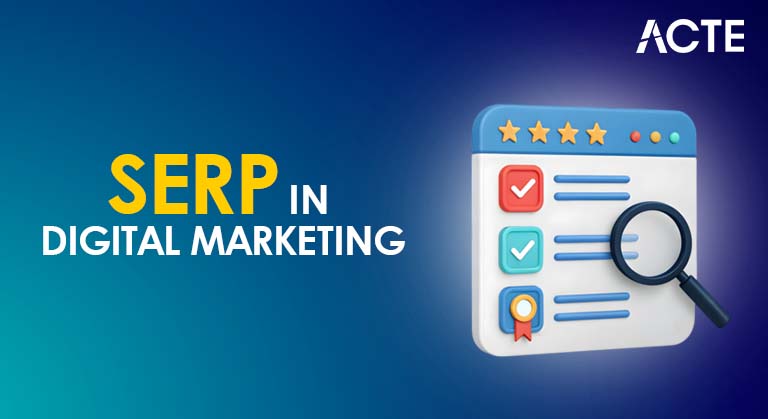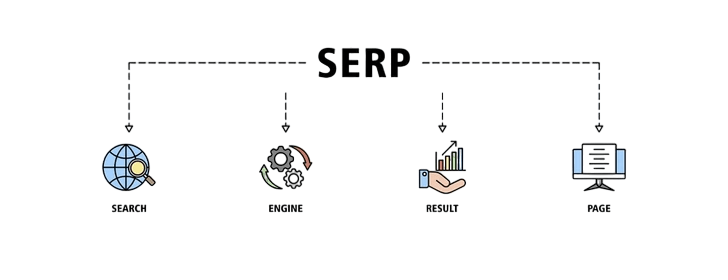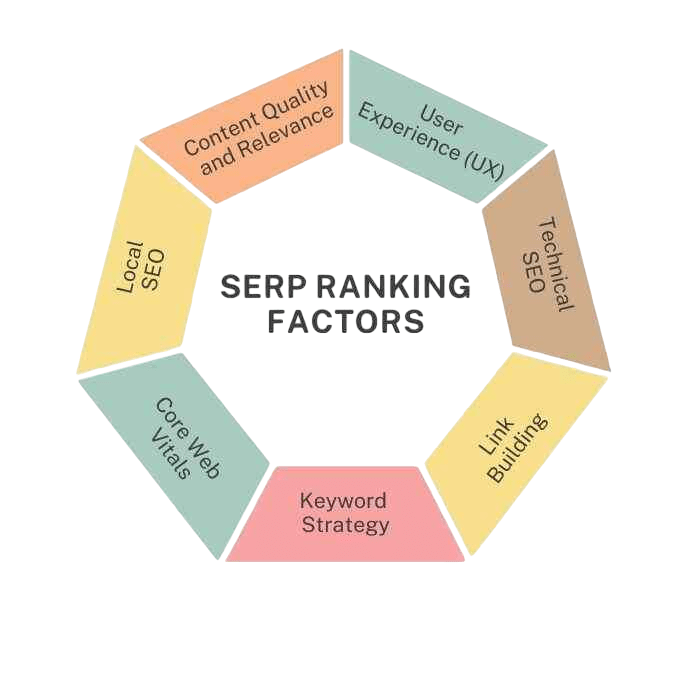
- Introduction to SERP
- What Does SERP Stand For?
- Components of a SERP
- Types of SERP Results
- Why SERP Matters in Digital Marketing
- How Google Ranks Pages on SERPs
- Key Factors Affecting SERP Rankings
- How to Optimize for Better SERP Positions
- Conclusion
Introduction to SERP
If you’ve ever typed a query into Google, Bing, or any other search engine, you have interacted with a Search Engine Results Page (SERP). These pages are crucial in SERP in Digital Marketing because they determine which websites get visibility and traffic.Understanding SERPs is fundamental for marketers who want to boost their online presence and attract more visitors organically.A Search Engine Results Page (SERP) is the page displayed by a search engine in response to a user’s query. It plays a crucial role in Digital Marketing Training and search engine optimization (SEO), as it determines which websites are visible to users and how prominently they are displayed. SERPs typically include a mix of organic search results, paid advertisements (PPC), featured snippets, knowledge panels, local listings, and other elements like images or videos depending on the query. The structure and content of SERPs vary based on factors such as the search engine used, the type of query entered, and the user’s location and device. Understanding how SERPs work is essential for businesses and content creators aiming to improve their online visibility and attract more web traffic.
Ready to Get Certified in Digital Marketing? Explore the Program Now Digital Marketing Online Training Offered By ACTE Right Now!
What Does SERP Stand For?
SERP stands for Search Engine Results Page. It is the page that search engines display after a user submits a search query. The SERP includes a list of results deemed most relevant to the query, including webpages, images, videos, local listings, ads, and more.SERP stands for Search Engine Results Page, which is the page displayed by a search engine like Google, Bing, or Yahoo in response to a user’s search query. When a person types a word or phrase into a search bar, SEO Tips To Rule Google Maps, the search engine processes the request and generates a list of results it considers most relevant. These results appear on the SERP in Digital Marketing and can include a variety of elements such as organic results, paid advertisements, featured snippets, image carousels, video links, news articles, and local business listings. The structure and content of a SERP depend on many factors, including the type of query, the user’s location, their browsing history, and the device being used. Organic results are ranked based on search engine algorithms that evaluate relevance, content quality, page speed, and other SEO factors. Paid results, on the other hand, appear because advertisers have bid on specific keywords through platforms like Google Ads. For businesses and digital marketers, SERPs are extremely important because ranking higher on these pages directly impacts website visibility and traffic.

Understanding how SERPs function allows brands to better optimize their content and advertising strategies, ultimately improving their chances of reaching target audiences and achieving online success.
Components of a SERP
A typical SERP includes the following elements:
- Organic Results: These are listings ranked by relevance using search engine algorithms.
- Paid Ads: Usually appear at the top or bottom of the page and are marked as ads.
- Featured Snippets: Highlighted answers pulled directly from websites, Digital Marketing Metrics shown above organic results.
- Knowledge Panels: Boxes displaying summarized information, often from Wikipedia or trusted sources.
- Local Packs: Maps and local business listings relevant to the query.
- Image/Video Carousels: Displays multimedia results related to the search.
- Paid Ads (PPC): Advertisements that businesses pay to display.
- Featured Snippets: Quick answers or summaries to queries.
- Local Packs: Local business listings with reviews and contact info.
- Shopping Results: Product listings with prices and images.
- People Also Ask: SEO Tips To Rule Google Maps. Questions related to the query with dropdown answers.
- Keywords: Using the right keywords helps your page get matched with queries.
- Backlinks: Links from other authoritative sites improve ranking.
- Technical SEO: Site speed, secure connections (HTTPS), and proper indexing.
- Mobile Optimization: Mobile-friendly pages rank better on mobile searches.
- User Behavior: Search engines use behavior data to refine rankings.
To Explore Digital Marketing in Depth, Check Out Our Comprehensive Digital Marketing Training To Gain Insights From Our Experts!
Types of SERP Results
Organic Listings: Webpages ranked based on SEO.
Why SERP Matters in Digital Marketing
ERP, or Search Engine Results Page, plays a crucial role in digital marketing because it directly influences how easily potential customers can find a business online. When users search for products, services, or information, they are most likely to click on results that appear on the first page of the SERP, especially those in the top three positions. This makes high visibility on SERPs essential for attracting organic traffic, increasing brand awareness, and driving conversions.For digital marketers, SERPs represent a highly competitive space where businesses vie for attention through strategies like search engine optimization (SEO) and pay-per-click (PPC) advertising. Appearing in prominent SERP features such as featured snippets, Digital Marketing Training , local map packs, or knowledge panels can significantly improve credibility and click-through rates. Additionally, understanding SERP behavior allows marketers to analyze user intent and tailor content accordingly, ensuring it aligns with what the audience is searching for.In short, the SERP is where digital consumers make critical decisions. A strong SERP presence can be the difference between a brand being discovered or being ignored. That’s why optimizing for SERP visibility is a foundational part of any successful digital marketing strategy.
Looking to Master Digital Marketing? Discover the Digital Marketing Expert Masters Program Training Course Available at ACTE Now!
How Google Ranks Pages on SERPs
Google ranks pages on SERPs (Search Engine Results Pages) using a complex and constantly evolving algorithm designed to provide users with the most relevant, high-quality content based on their search queries. At the core of this process is Google’s algorithm, which evaluates hundreds of ranking factors to determine the order in which websites appear. Key factors include relevance, content quality, backlinks, page speed, mobile-friendliness, Top Digital Marketing Experts and user experience. Google begins by crawling and indexing web pages, then analyzes how well a page’s content matches the user’s intent behind a search query. Pages that provide clear, informative, and trustworthy answers tend to rank higher. Backlinks from authoritative websites act as “votes of confidence” and significantly influence a page’s ranking. Additionally, on-page SEO elements like proper use of keywords, title tags, meta descriptions, and structured data help Google better understand the content.

User behavior also impacts rankings. If users frequently click on a result and stay on the page (low bounce rate), it signals that the content is useful. Google also considers technical aspects like HTTPS security, page load times, and mobile responsiveness. Ultimately, Google’s goal is to rank content that best serves the searcher’s needs.
Key Factors Affecting SERP Rankings
How to Optimize for Better SERP Positions
Optimizing for better SERP (Search Engine Results Page) positions involves a strategic combination of technical improvements, high-quality content creation, and smart keyword targeting. The foundation of strong SERP performance is effective Search Engine Optimization (SEO). This starts with thorough keyword research to identify the terms your audience is searching for. Once the right keywords are selected, they should be naturally incorporated into your page titles, meta descriptions, headers, and throughout the content to improve relevance. Types of Social Media ,Creating valuable, original, and informative content that directly answers users’ questions increases the likelihood of appearing in top results, including featured snippets. Equally important is earning backlinks from credible, authoritative websites, which boosts your domain’s trustworthiness in Google’s eyes. From a technical perspective, ensure your website is mobile-friendly, loads quickly, and uses secure HTTPS encryption. A clean site structure with proper internal linking and schema markup also helps Google better understand and index your content. Additionally, optimizing for local SEO, such as managing your Google Business Profile and gathering positive reviews, improves visibility in local search results. By consistently applying these strategies, businesses can increase their chances of ranking higher on SERPs, leading to greater visibility, more clicks, and better overall digital performance.
Preparing for Digital Marketing Job Interviews? Have a Look at Our Blog on Digital Marketing Interview Questions and Answers To Ace Your Interview!
Conclusion
Understanding SERP is crucial for any digital marketing strategy. By optimizing your website and content to perform well on search engine results pages, you increase your chances of attracting organic traffic, building brand authority, and boosting conversions.Stay updated with SERP trends and algorithm changes to keep your digital presence strong and competitive.In the digital age, understanding and optimizing for SERPs (Search Engine Results Pages) is essential for any business or individual aiming to build a strong online presence. A high position on SERPs not only increases visibility but also drives valuable organic traffic, enhances credibility, and boosts conversion potential. By focusing on SEO best practices such as quality content, relevant keywords, technical optimization, and backlink building Digital Marketing Training can significantly improve their chances of ranking higher. As search engines continue to evolve, staying informed about SERP in Digital Marketing trends and user behavior remains crucial. Ultimately, effective SERP optimization is not just about getting clicks it’s about delivering value to users and building lasting online success.




